Are you thinking about getting a VPN subscription to improve your online privacy and security? In that case, you’re met with two obvious choices – free or paid VPNs. People who aren’t tech-savvy and they don’t have prior experience with these services are going to think that free providers are sufficient.
However, they most certainly aren’t, especially if you plan on using them each day. Right off the bat, I’ll tell you that premium providers are a much better choice, but that’s not going to be left with no argument. Today’s article is about free VPNs vs paid VPNs and their differences.
I’ll explain to you which choice is better, why, and when to use either of these providers. Also, I’ll give you some bits of advice on which VPN to choose, so this is an end-all-be-all guide for people looking to get a VPN subscription for whatever purpose.
Free VPN vs Paid VPN Differences
With hundreds of providers on the market, it’s logical that you can expect quite a few differences. These differences are even more prevalent when talking about free VPNs vs paid VPNs as we’re talking about two totally different sides of the spectrum.
In this part, I’ll compare free and paid VPNs side-by-side and see why paid providers are much better.
Security Functionalities
Let’s start with one of the biggest differences when talking about free vs paid VPNs. Security is a BIG part of a VPN service and people who subscribe to it expect it to be a primary factor. In my recent ProtonVPN review, I explained that its free version is secure and offers a no-logging policy.
However, it still misses some security features from the paid version that make the provider better. As you can guess, free providers don’t offer many security features, to begin with, so your connection isn’t as secure and encrypted as it is with paid providers.
For example, many free providers will offer 128-bit instead of 256-bit encryption, and many of them lack a kill switch which is necessary for preventing IP/DNS leaks. In fact, many free services are known for these leaks and outdated protocols, which expose your true IP and fail to protect your privacy.
Not to mention that a good percentage of free VPNs are riddled with malware and spyware. Many technical analyses online showed that providers like Betternet VPN, EasyVPN, and OkVPN contain one or more malware types, making them extremely risky to use.
Malwares that is injected into these providers is here to track your activities and steal your personal data, which is then sold to the highest bidder. On the other hand, paid providers provide a vastly different experience.
You get all the important security features, such as bank-grade AES-256 encryption, a kill switch, split tunneling, and RAM-based servers where all data is wiped with each restart. Providers like ExpressVPN and NordVPN also offer a Private DNS service which further increases your level of security.
These providers are known for having absolutely NO IP and DNS leaks, making them as secure as possible. Besides, premium providers often have these security audits from third-party companies, granting an official certificate of their rock-solid security.
And to that, we should add advanced features like WiFi protection, advanced security protocols (Lightway, NordLynx, WireGuard), and no presence of malware/viruses, rendering them 100% safe to use.
Performance (Speed) and Bandwdith Limits
In this free VPN vs paid VPN duel, we should also talk about performance and bandwidth limits. Let’s start with free providers. Their outdated 1 Gbps server infrastructure provides poor speeds and performance from the get-go, which is highlighted in multiple tests and reviews online.
This is further exacerbated by the aforementioned outdated protocols that fail to deliver better performance. Sure, many of them use OpenVPN, but some free providers rely on IKEv2 or their “proprietary” protocols with no external audits to prove they’re worthy (Hydra, for example).
Nevertheless, when using a free VPN, you will notice that performing bandwidth-hungry activities will be slow, choppy, and full of waiting that will just go on your nerves. That’s why free providers aren’t suitable for streaming or torrenting which many people are disappointed in.
Take a look at the speed test of Betternet.
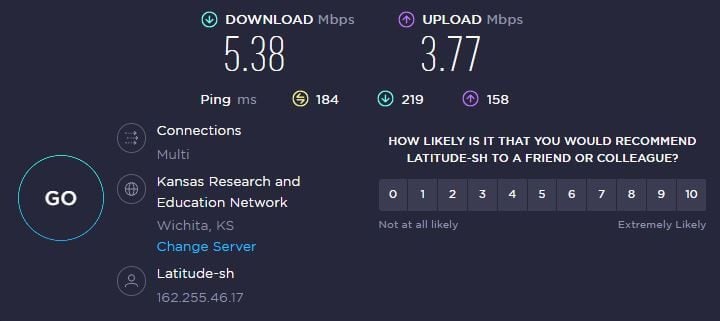
Another vital point is that, along with slow speeds, they ALSO limit your monthly bandwidth! Just think about TunnelBear. This free VPN offers 500 MB to 1 GB of monthly data, which you can spend in about 5 minutes watching a YouTube video.
Then, we have Hide.me – a provider with 10 GB of data, which you can spend in what? Like 2-3 days? Some free providers offer unlimited bandwdith, to be honest, but they’re rare, they’re pretty slow, and offer no streaming/P2P support, so they’re pretty much useless.
The best premium VPNs like ExpressVPN, CyberGhost, NordVPN, and others offer no bandwdith limits. This means you can browse the web, stream, download torrents, or do anything else infinitely – the same way you’d do when not using a VPN, but with added security. (Check the ExpressVPN speed test below.)
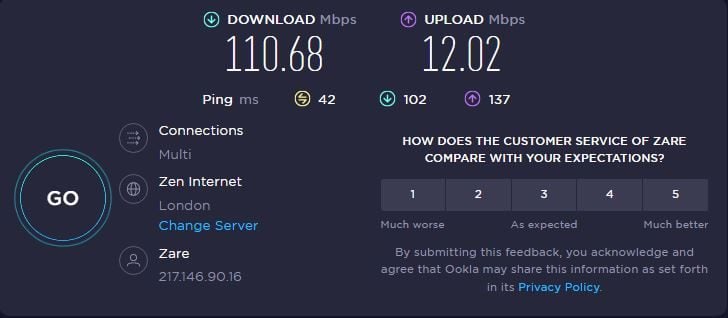
Performance-wise, paid providers have significantly more resources, which plays a huge part. As such, they can afford to maintain and add 10 Gbps servers to the roster, which will maximize your speeds and result in stable performance with no slowdowns, throttling, and endless buffering when streaming.
Privacy (Or Lack Thereof)
Our paid VPN vs free VPN duel won’t be complete without talking about privacy. This is a pretty sensitive topic for free VPNs that put your privacy on the last spot of the list of priorities. Trust me – very few free VPNs have a high level of privacy, except for ProtonVPN and Hide.me.
Unfortunately, ProtonVPN is very slow, and Hide.me offers a 10 GB monthly bandwidth cap, none of them are great. In the majority of cases, free VPNs won’t have a no-logging policy and they’ll collect and sell your information to third-party companies.
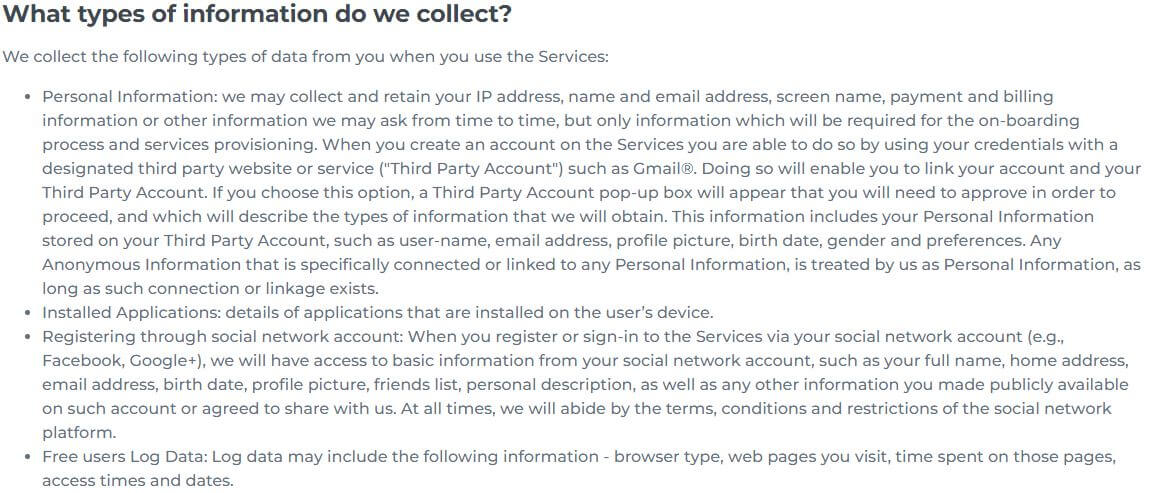
While not many of them will admit it openly, I can assure you they’re also tracking your online activities and everything you do while using them. This is especially true for providers like Hola VPN, Betternet VPN, and Hotspot Shield which are notorious for these practices.
Hola, in particular, uses P2P technology for its VPN, meaning that you share your idle resources with other users who can hijack your IP address and use it for all kinds of purposes. Free mobile VPNs are the worst kind here because they’re known for the highest degree of logging and tracking your activities.
Just think about it – how do free VPNs display targeted ads in their apps? They track your browsing! This is another annoying aspect of free providers that many people find infuriating – ads and pop-ups on every step. If you’re worried about your privacy, I strongly advise NOT to use free VPNs.
You can instead check my list of the best VPNs for privacy and pick one VPN from there. Paid providers, on the other hand, do everything in their power to protect your privacy. They offer a no-logging policy, which means storing no logs of your activities, IP address, DNS queries, geolocation, etc.
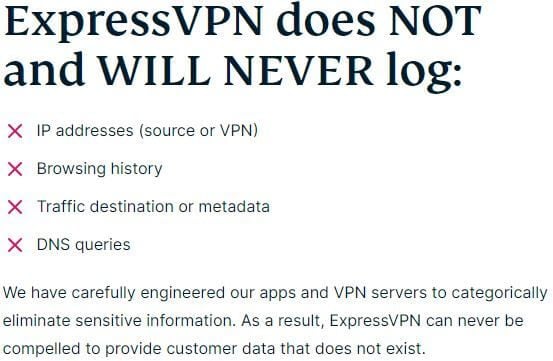
Their no-logging policies are verified by companies like Cure53, PwC, and Leviathan Security, making these providers that much more trustworthy. Not to mention that some paid VPNs like CyberGhost also have transparency reports – a welcome addition to transparency.
In short, in this free VPN vs paid VPN comparison, you’ll get better privacy with paid VPNs. They’ll store no personal information or any online activities, on top of which, they’ll hide your IP address and true location, making you 100% anonymous online.
Customer Support
If you run into any trouble like failed VPN connections, IP or DNS leaks, or anything else, customer support should be there to help you out. Customer support requires additional resources since support agents must always be on guard for new issues that arise.
Free providers, as you can guess, offer limited customer support that often comes in the form of email support or a ticketing system. This means you have to fill in a ticket or send an email and wait for a response. The waiting time, in this case, can go up to a few days, unfortunately.
You’re then left with no VPN and you can’t protect your privacy or enjoy browsing the dark web safely, for instance. Customer support in free VPNs is often not very helpful and it doesn’t work 24/7, which is why you get slow responses, making the problem-solving process tedious.
Having in mind this free VPN vs paid VPN comparison, we should talk about premium support in paid VPNs. First, you get 24/7 support through live chat, which means instant responses and fast problem-solving, even for the most complex issues.
Next, while these providers offer email support as well, this type of support is also significantly faster than free VPNs. On average, you can expect a response in 5-15 minutes when using email support, while live chat support agents are there as soon as you type in the question.
Not to mention numerous frequently asked questions, Help Centers, guides, and even YouTube channels that many paid providers offer. Simply put, they’re available at any time to fix potential issues, which means a lot when you need to get a VPN running quickly and with no bigger delays.
Server Coverage
Server coverage is yet another important factor that differentiates free VPNs from paid VPNs. You’ve already learned that free VPNs are limited in what they offer and the same applies to their very small server networks.
The largest server network of any free VPN can be found in TunnelBear, with around 40 countries and 500 servers around the globe. All other providers usually offer from 1 to 5 countries, with servers that are based usually in the Netherlands or the United States.
Take ProtonVPN or Hide.me as an example. ProtonVPN has 3 server locations while Hide.me has 5 of them. This trend continues with the providers like Betternet VPN and even Hotspot Shield which offers only one server location in the US.
The number of servers is in direct correlation with speeds and performance. With a smaller server fleet, overcrowding is more likely to happen, which overloads the network, resulting in each user having poor performance, connection stability, and speeds.
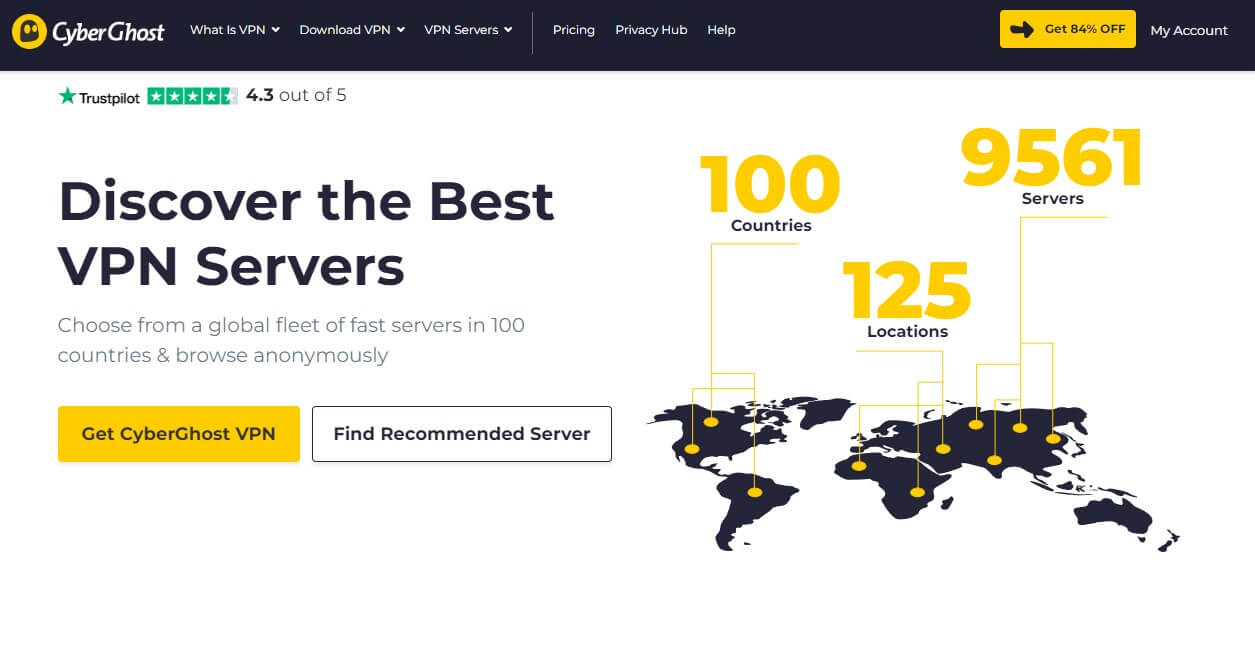
Paid VPNs will always offer larger server fleets. If you choose ExpressVPN or NordVPN, for example, you can enjoy thousands of servers in dozens of countries globally. ExpressVPN has 3,000 servers in 105 countries while NordVPN boasts 5,500 servers in 60 countries.
CyberGhost has 9,550+ servers in 100 countries, while PIA VPN offers 30,000 worldwide servers in a bit under 90 locations. All of this means that you’re more likely to find a fast server but also a server in another country for bypassing geo-restrictions effortlessly.
Additional Functionalities (P2P, Streaming, …)
Finally, it’s crucial to mention other VPN functionalities such as streaming, torrenting, and other advanced features that providers offer or don’t offer (if we’re talking about free providers).
Streaming Capabilities
When it comes to streaming, free providers are the worst choice you can get. They won’t work with platforms like Netflix, Hulu, or Disney+ abroad as they’re easily detected and blocked by such geo-restricted services.
Not only that but the majority of them will have no streaming support at all, meaning that unblocking any platform will be impossible. Coupled with slow speeds and limited bandwidth, they’re useless in any case because you won’t be able to enjoy streaming for more than an hour each month.
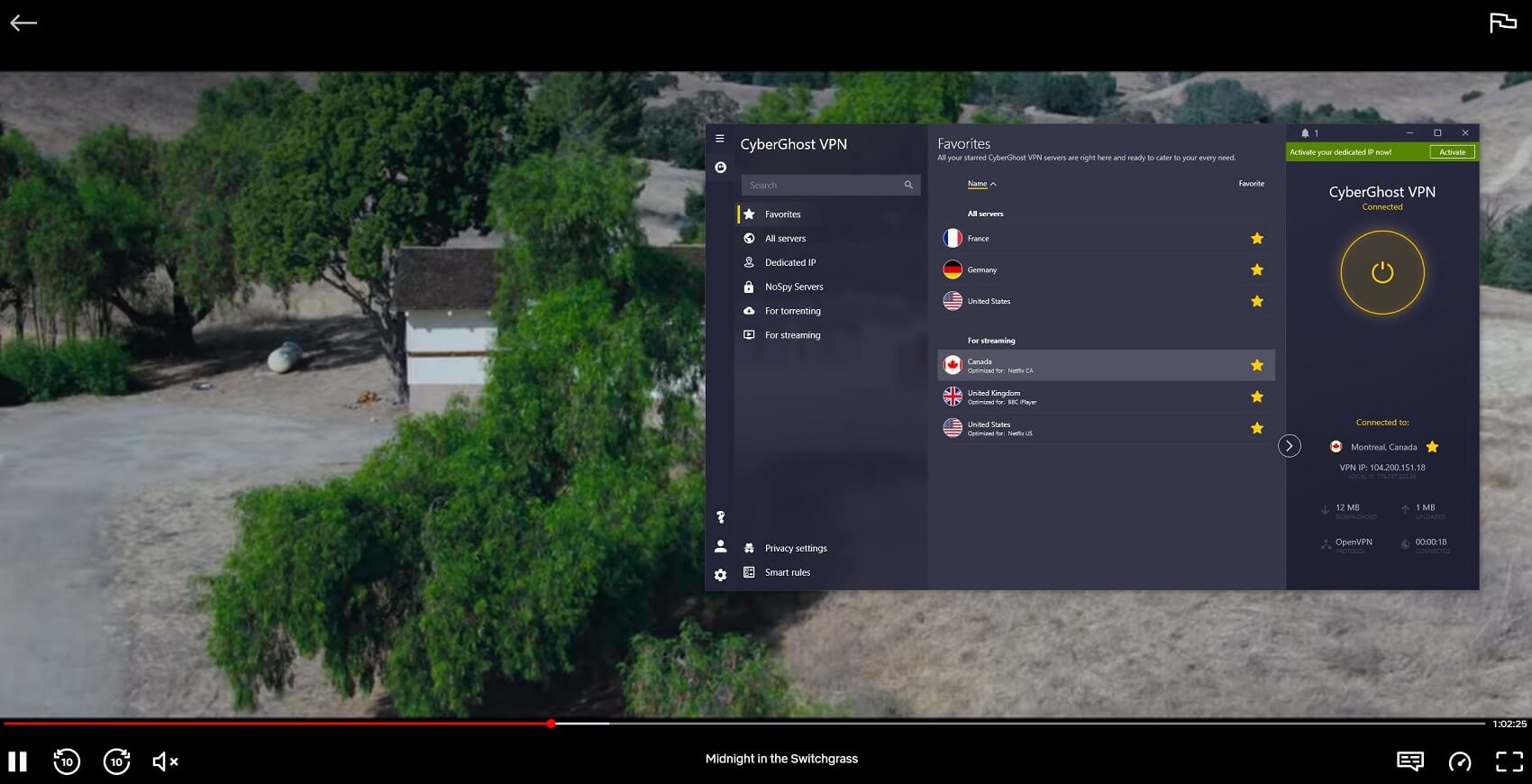
Paid providers like the ones we mentioned are the polar opposite. They have every prerequisite to be great VPN services for streaming. For instance, CyberGhost offers dedicated streaming servers that work with Netflix US, Prime Video, Hulu, Disney+, Hotstart, and other platforms.
With unlimited bandwidth and 10 Gbps blazing-fast servers, streaming even in 4K will be smooth. Plus, paid providers tend to offer more apps for streaming devices like Fire TV Stick, Android TV, and Smart TV, making them more versatile as a result.
Torrenting (P2P) Allowance
Torrenting is pretty much always forbidden in free providers. In this free VPN vs paid VPN duel, I highlighted that paid VPNs offer no limits, which also applies to P2P and torrenting. I tried downloading torrents with many free providers, only for my attempts to be futile.
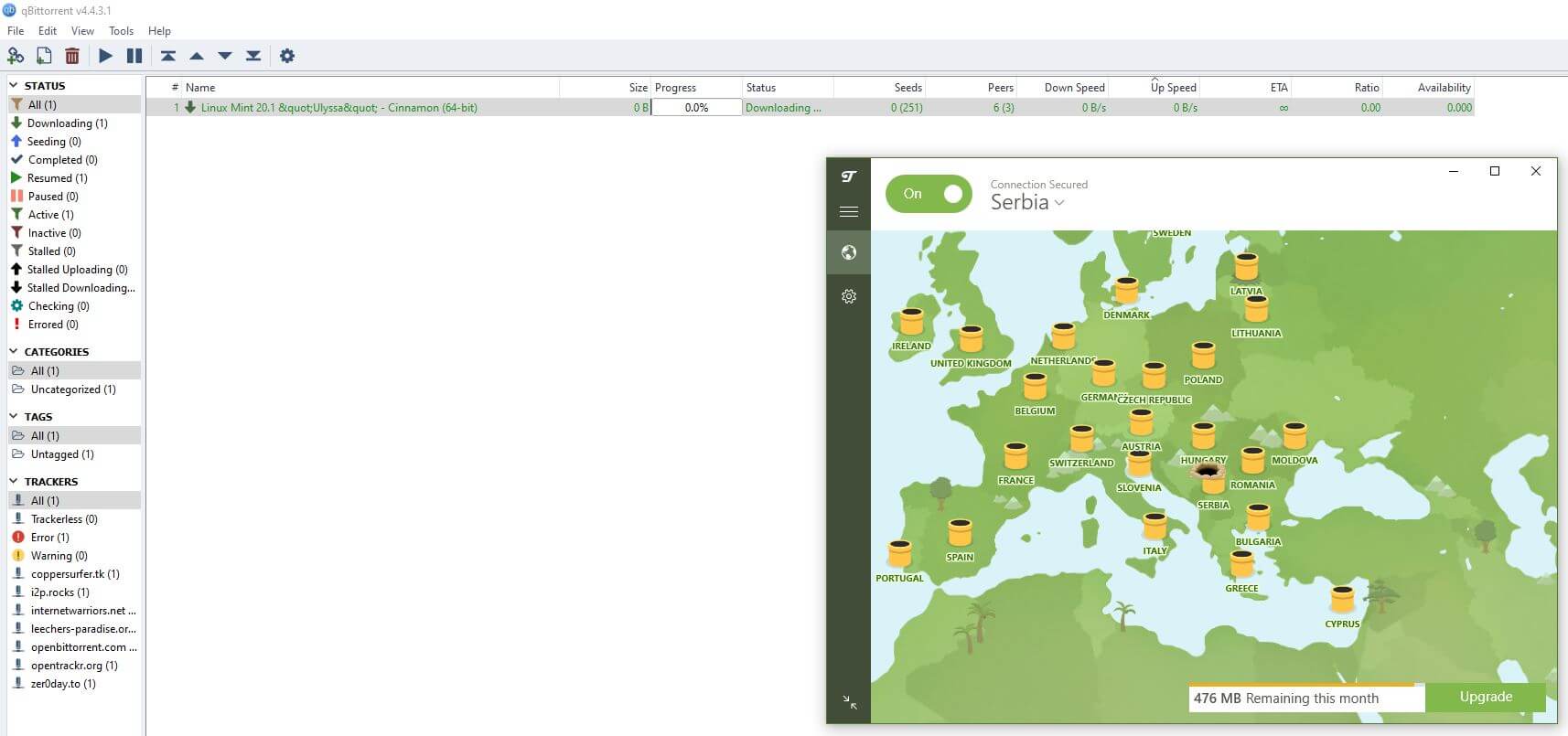
In the image above, you can see that TunnelBear doesn’t work. It says “Downloading”, yet, my upload and download speeds are at 0 B/s. Free providers that allow P2P traffic are limited in terms of bandwidth, which also isn’t an ideal case.
Also, given their logging practices and lack of security, downloading torrent files with a free VPN isn’t very smart because you can still be traced, detected, and reported to your ISP. Using a paid VPN to download torrents, you can see a big difference.
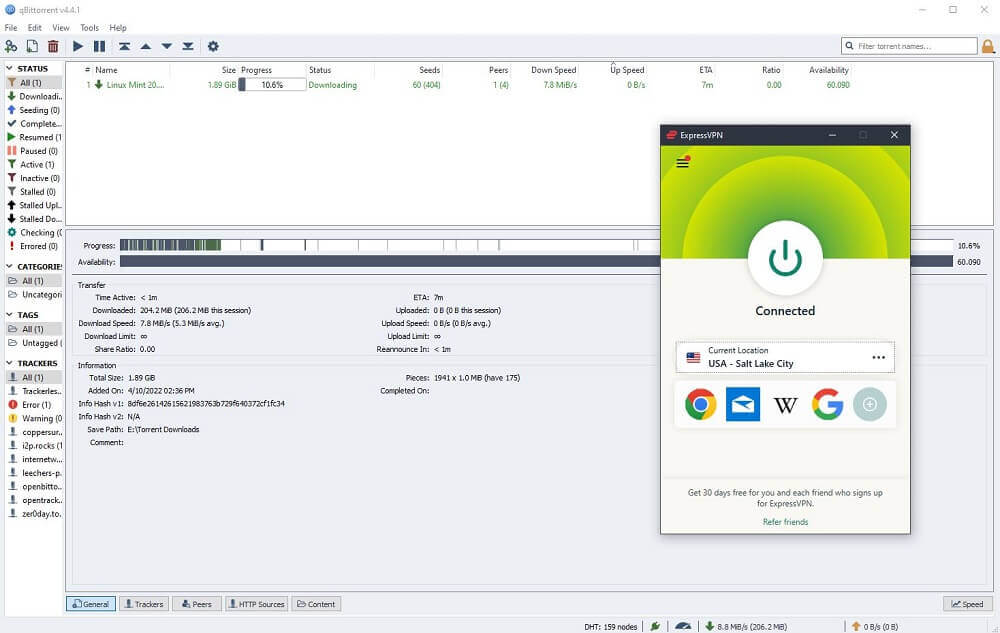
Not only will it work properly but you’ll also get excellent speeds, amazing performance, and perfect anonymity for all your P2P activities. Some providers even have special P2P servers, like CyberGhost and NordVPN, and they’re optimized for torrenting, ensuring an optimal experience.
We should also remind ourselves of the unlimited bandwidth that these providers offer, which translates to limitless torrenting.
When Should I Use Free VPNs?
Having said in this free VPN vs paid VPN comparison, we can confidently conclude that using a premium VPN is a much better choice. However, we can’t say that all free providers are necessarily bad, although they’re always inferior to paid providers.
That begs the question – when should I actually use a free VPN? Well, I look at free providers as good short-term solutions for various scenarios, but of course, I’m talking about quality providers like ProtonVPN, Hide.me, and Atlas VPN.
These three providers give you a no-logging policy and they come with basic security features that will keep you anonymous online. Keep in mind that none of these providers are streaming-friendly and they don’t allow for P2P traffic, so they can be used pretty much only for browsing.
If you, for example, travel abroad, and you can’t afford a VPN subscription, you can use one of these 3 free VPNs to gain public WiFi protection or access a geo-restricted site from your home country. Also, some free providers can unblock foreign TV channels abroad, so they can be useful for that purpose too.
Although, with limited bandwidth and slow speeds, you shouldn’t expect miracles in terms of unblocking capabilities or everything else. For the best possible performance, you’ll still need a paid provider, which isn’t a bad thing because paid providers offer a money-back guarantee.
Best Paid VPNs to Use in 2024
If you’re thinking about free VPNs vs paid VPNs and which one to get, I suggest taking advantage of a money-back guarantee that paid providers come with. You see, ExpressVPN and NordVPN offer a 30-day refund period for all of their subscription plans.
Even better, CyberGhost comes with a 45-day money-back guarantee, letting you use it risk-free for 45 days before getting a refund. Logically, these are my top 3 favorite paid VPNs that you should try.
1. ExpressVPN
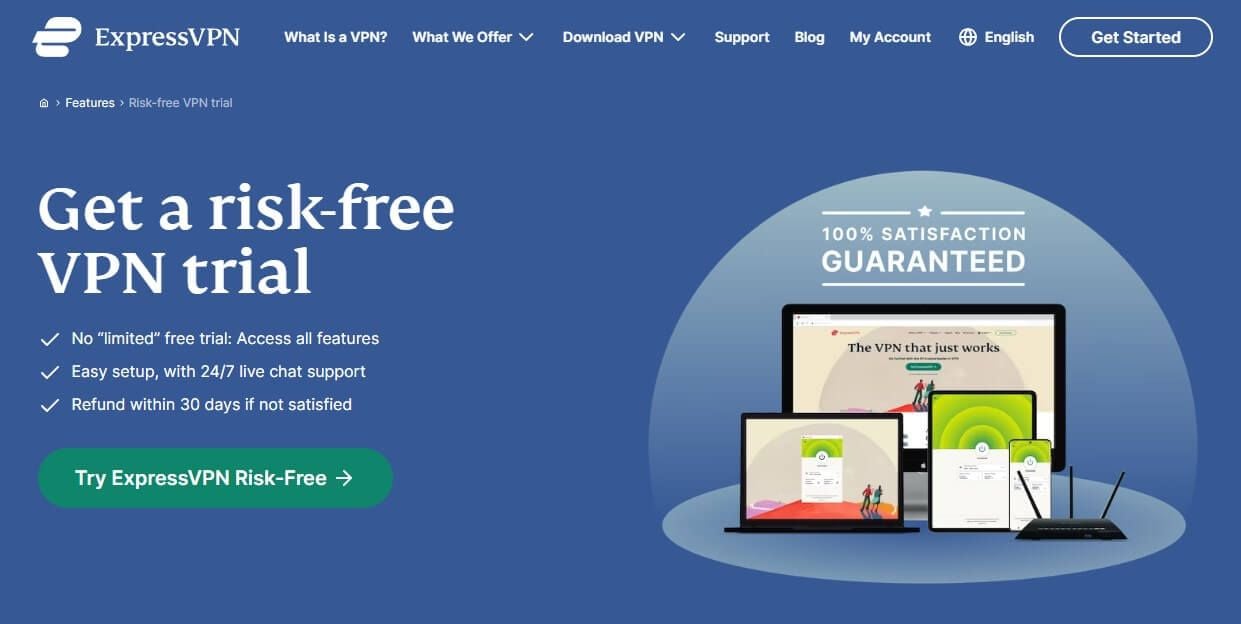
As stated, ExpressVPN comes with 3,000 servers in 105 countries, offering top-grade performance, excellent streaming capabilities, and impenetrable security. Compared to free providers, it’s superior in every sense, even in terms of device compatibility and simultaneous connections.
Free providers grant you only one connection per account and with ExpessVPN, you can protect 8 devices simultaneously. Its applications are available for all platforms, so you can install and use this VPN even on a Smart TV or Fire TV Stick in addition to desktop/mobile platforms.
ExpressVPN currently offers a huge 49% discount for its annual plan where it sprinkles in 3 FREE months. Coupled with a 30-day money-back guarantee, this is a great choice if you want to use a premium VPN for 30 days without losing money.
2. CyberGhost
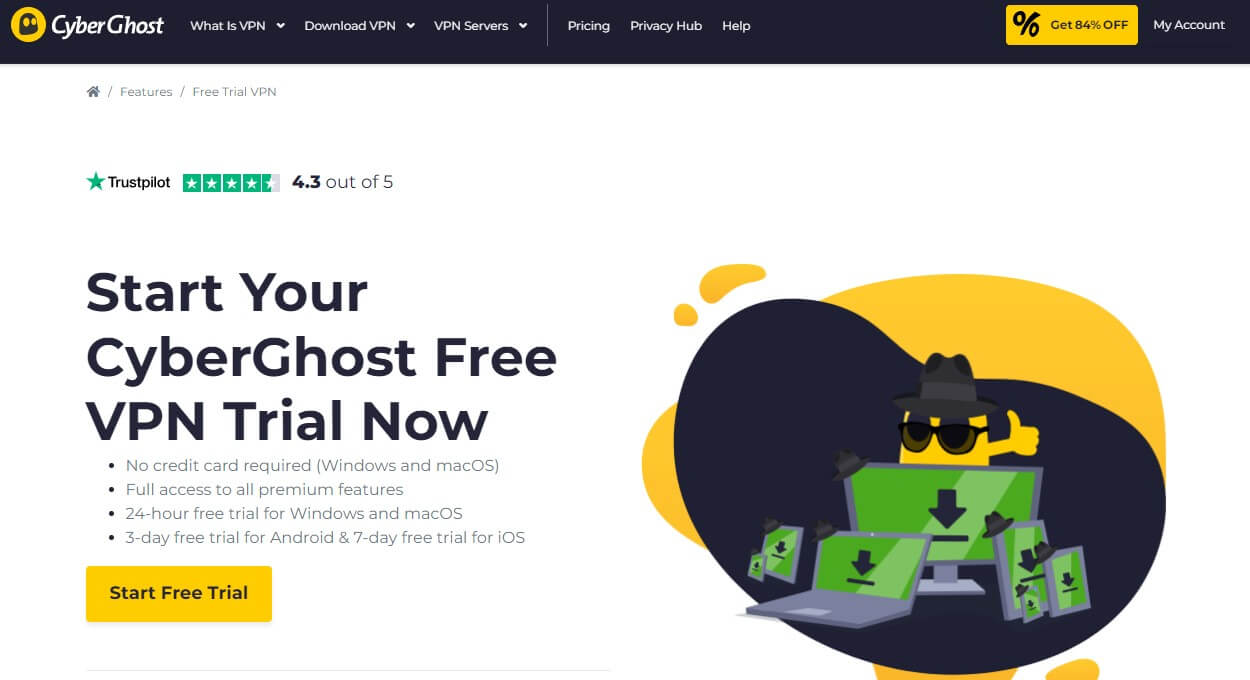
CyberGhost is one of my favorite affordable VPN services on the market. It costs way below $2.5 a month and offers a 45-day refund period for all long-term plans. Still, it’s known for blazing-fast performance, specialty servers, and easy-to-use clients for desktop and mobile platforms.
CyberGhost offers NoSpy servers as well, which will help you preserve your privacy amidst constant government surveillance. Important to mention is a no-logging policy and features like WireGuard, ad blocker, and 256-bit AES encryption.
The provider offers 7 simultaneous connections and you get premium 24/7 live chat support in English, German, and French. All of this makes CyberGhost a perfect choice that you can test out after reading this free VPN vs paid VPN comparison.
3. NordVPN
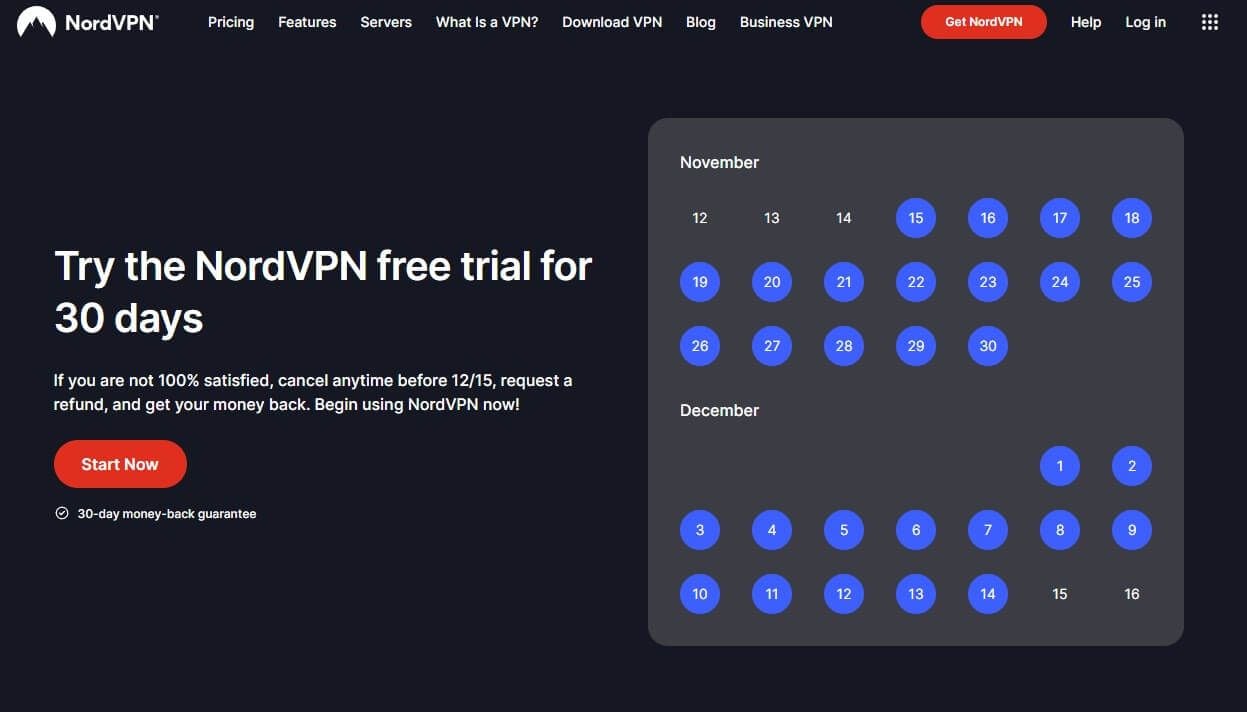
NordVPN can also be used for free for 30 days thanks to a money-back guarantee. Simply get its cheap 2-year plan, enjoy the provider limitlessly, and request a refund in the first 30 days. NordVPN is one of the safest providers with bank-grade encryption, Threat Protection, and Dark Web Monitor.
It offers cutting-edge VPN technology in the form of Private DNS, NordLynx, and RAM-based servers, ensuring your personal data remains private. Besides, it comes with 3 security audits from PwC and Deloitte and its specialty servers are great for torrenting, browsing the dark web, and bypassing censorship.
NordVPN is pretty affordable as well, yet, it comes with 6 simultaneous connections per subscription. Needless to say, it works on all devices and platforms, unlike free providers, so you can protect each device in your home with little to no effort.
Summary
In today’s paid VPN vs free VPN comparison, you’ve learned that paid VPNs are superior in every way. While free providers don’t have to always be considered “bad”, know that their limits in terms of security, bandwidth, performance, and other features will cripple your experience with them.
Paid providers, on the other hand, impose no limits and they make sure you get the best possible experience because you’re paying for it. Besides, paying for a VPN ensures that your data isn’t sold to third parties because the company can earn enough money from subscriptions.
In the end, I want to address two things that people often say that can often be attributed to the VPN industry. The first one is the fact that there’s no such thing as a free lunch, and second, if something’s free, you’re the product.
Thus, if a VPN promises to be 100% free while offering unlimited bandwidth and everything else, know that something’s not quite right. Actually, you’re the product in this case because you’re trading your privacy for an average free VPN, so you’re the one getting fleeced like sheep.
Either way, there’s always a price for everything. The question is – do you want to surrender your privacy or pay a few dollars a month to get everything you need PLUS uncompromising privacy? If you’re still in doubt about free VPNs vs paid VPNs, go back to the start and read the article again…
FAQ
Here, we answer a few more questions we haven’t discussed so far.
Is it true that free VPNs can come with malware?
In some instances, yes, it is true. Users discovered many VPNs that secretly install malware and even viruses on users’ computers for spying and mining. For example, we found that AmanVPN, which is both free and paid, installed several malware programs on our computer.
Interestingly, during our SlickVPN review, we found the same. After performing a malware check with Malwarebytes, the app detected malware from BOTH providers at the same time. Be aware that even some paid VPNs are notorious for this and SlickVPN is a prime example.
If you want to steer clear of such practices, ExpressVPN, CyberGhost, and NordVPN are your top choices. We personally tested them on multiple occasions and through various antivirus/anti-malware solutions. So far, we haven’t found a single discrepancy.
Are paid VPNs necessarily better?
In 99% of the cases, they are. However, there are some exceptions to the rule, especially because some paid VPNs are overpriced and offer very little. Free VPNs can sometimes be faster than paid providers but only when we’re discussing really BAD paid services like Brave VPN, for example.
Also, we found that, in some instances, paid services can have more servers than their paid counterparts. Again, this doesn’t apply to the top-of-the-line providers that we mentioned previously. That’s why it’s vital to spend your money right and not buy a half-baked VPN.
Are there any safe free VPNs?
Yes, there are tons of them and we mentioned a few before. Most notably, Atlas VPN, which is now a subsidiary of NordVPN and offers a certified zero-logs policy. You also have an extremely safe VPN like ProtonVPN or even Hide.me, with a strict policy against logging.
Here, we can also mention PrivadoVPN but this VPN has no third-party audits, so it’s not as safe as its rivals. Everything is better than Hola, Urban VPN, Hotspot Shield, and other questionable providers.